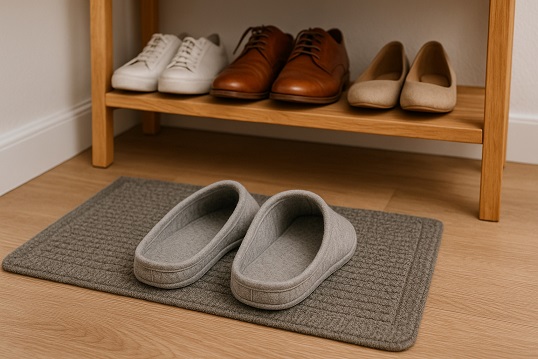
You’ve been invited to a German home. The host greets you with a smile, you hand over a polite gift – and then comes the moment of truth: do you keep your shoes on, or start unlacing at the door?
In Germany, the answer is clear – shoes off. While not every single household follows the rule, the overwhelming majority do. It’s one of the most widely practiced and yet often unspoken rules of German domestic life. Getting it right shows cultural awareness. Getting it wrong risks awkward stares and muddy floors.
This article explains why Germans care so much about footwear in the home, what to expect when you cross the threshold, and how to handle it when you’re not sure what to do.
Why Shoes Are Removed Indoors in Germany
The practice of removing shoes in German homes is grounded in values of cleanliness, order, and respect. Outside dirt is seen as something to be left at the door – literally.
Shoes carry dust, mud, and germs from the street. Germans, who place high importance on hygiene and well-kept living spaces, generally avoid tracking any of that indoors. This is especially important in cities where people use public transport or walk long distances in all kinds of weather.
But it’s not just about dirt. It’s also about psychology. Taking off your shoes marks the transition from public to private. It signals a shift into comfort, quiet, and domestic calm. For Germans, the home is a protected, orderly environment – and removing your shoes is a sign that you respect that.
What Happens When You Enter a German Home
When you step into a German hallway (called a Flur), you’ll usually find:
- A shoe rack or shelf along the wall
- A small rug or mat to stand on
- A collection of house shoes (Hausschuhe) or guest slippers
- Hooks or space for coats and bags
Most hosts will invite you to remove your shoes without saying so outright. If you’re unsure, simply ask, “Soll ich die Schuhe ausziehen?” (“Should I take my shoes off?”) They will likely answer with a smile and a quick “Ja, bitte.”
In some cases – especially in more modern or informal households – the host may say “Ach, ist nicht nötig” (“Oh, it’s not necessary”). But even then, many guests will take their shoes off anyway, unless directly told not to.
Guest Slippers: The German Hospitality Detail You Didn’t Expect
One charming detail you’ll encounter in many German homes is the provision of guest slippers. These may be stored near the door and come in various sizes. It’s a subtle but generous gesture – your host is offering both cleanliness and comfort.
Guest slippers are usually simple: felt slip-ons, soft sandals, or cotton house shoes. Some hosts even keep new, unused pairs for visitors. Don’t be surprised if you’re asked to pick your size from a basket – it’s part of the culture.
And if there are no slippers provided? Bare feet or socks are completely acceptable. You won’t offend anyone as long as the shoes stay at the door.
When It’s Acceptable to Leave Shoes On
There are exceptions, of course. In some very formal dinner parties, or at events hosted in high-rise apartments with polished flooring, hosts may insist that shoes remain on. The same goes for certain Airbnb stays, professional meetings, or gallery-style open homes. But these are rare.
In general, unless you’re specifically told to keep them on, assume the default is: remove your shoes.
Why This Rule Matters More Than You Think
While it might seem like a small detail, observing this custom demonstrates respect and adaptability. Germans place a premium on personal boundaries and household order – and honoring their home environment is one of the clearest ways to signal that you understand and appreciate their culture.
Ignoring the shoes-off rule – especially in a home where everyone else is in socks – might not cause open offense, but it definitely creates an impression of cultural tone-deafness.
Regional and Generational Variations
In southern Germany – especially in Bavaria and Baden-Württemberg – the shoes-off rule is nearly universal. In larger cities like Berlin or Hamburg, younger or more international hosts may be more relaxed, especially in shared apartments. Still, most people follow the tradition regardless of age or region.
Older generations in particular often take pride in their home’s cleanliness. Visiting your German partner’s parents for the first time? Play it safe and remove your shoes without hesitation.
Planning Ahead: What to Wear (or Bring)
If you know you’ll be taking your shoes off, plan your outfit accordingly. Avoid holey socks or uncomfortable tights. If you’re unsure about the slipper situation, you can even bring your own soft indoor shoes – this is especially thoughtful during the colder months or if you’re staying overnight.
For formal visits, neutral socks or simple foldable ballet flats are practical choices. In winter, woolen socks or indoor booties are both cozy and culturally acceptable.
What If You Forget or Make a Mistake?
If you forget and start walking through the house with shoes on, stop as soon as you notice. Apologize briefly – “Oh, Entschuldigung!” – and remove your shoes. Germans are generally understanding, especially with guests from abroad. The key is acknowledging the slip and adjusting quickly.
Indoor Etiquette Beyond Footwear
Once inside, there are a few other habits to note:
- Don’t wander uninvited into private rooms like bedrooms or offices
- Wait to be invited into the kitchen or asked to sit
- If you’re offered a drink or snack, accept politely – declining can be seen as overly formal
- Complimenting the home is always a nice touch – especially if it’s tidy or beautifully decorated
In many ways, how you behave inside the home mirrors the respect you show at the door.
Cultural Snapshot: What Shoe Etiquette Reveals About Germany
This small ritual – removing your shoes – actually says a great deal about German society. It reflects:
| German Value | Expression in the Home |
|---|---|
| Cleanliness | No street dirt indoors |
| Order | Structured indoor behavior |
| Respect | Honoring host’s space |
| Boundaries | Private and public separate |
| Practicality | Socks or slippers for comfort |
It’s not just a quirk – it’s a symbol of how Germans view the home as a place of calm, cleanliness, and quiet dignity.
Key Takeaways
- Always assume you’ll need to remove your shoes when entering a German home
- Look for visual cues like a shoe rack or slippers
- Ask if you’re unsure – the host will appreciate your consideration
- Guest slippers are common and a sign of warm hospitality
- Leaving your shoes on without asking can be seen as inconsiderate
- Regional and generational differences exist, but the rule is widely followed
Related Articles:
➡️ Invited to a German Home? What to Bring and How to Behave
➡️ What to Bring When Invited to a German Home: Flowers, Gifts, and Faux Pas
➡️ Dinner at a German Home: Manners, Conversation, and When to Leave
➡️ Staying Overnight: Rules, Rituals, and Respecting Your German Hosts







